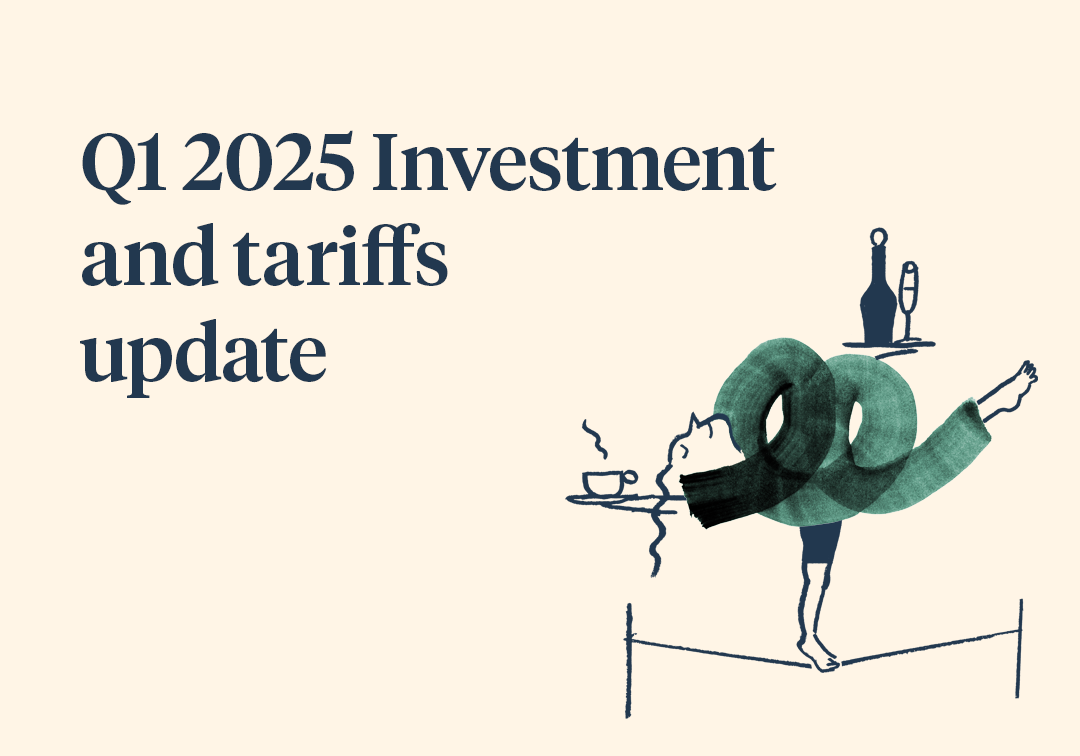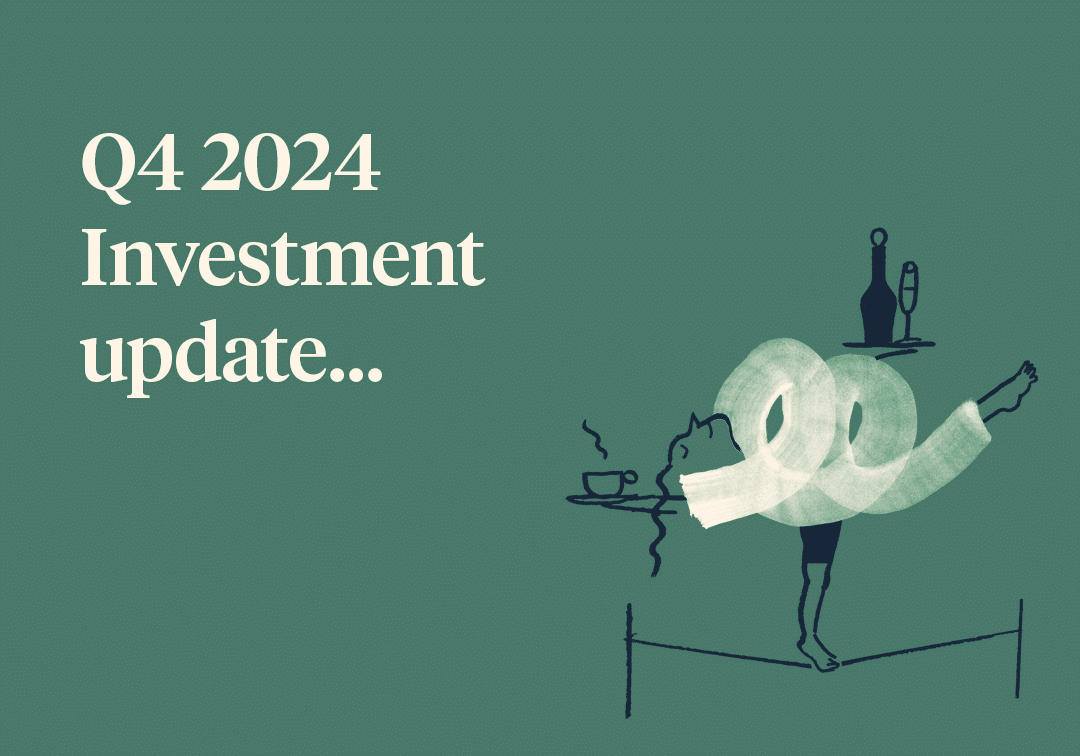Transcript
Jordan Gillies:
Hello, and welcome to our Q2 investment update. My name’s Jordan Gillies, and I’m one of the partners here at Saltus. I’m once again joined by Mike Stimpson from our investment team, whose going to take us through what happened last quarter and perhaps a bit about what’s to come as well. So Mike, it has been a pretty tough quarter to say the least, the S&P 500 is down almost 20%. It feels like there’s nowhere to hide, apart from perhaps oil and commodities, everything seems to be falling in value. Inflation really is running away with itself, or at least that’s what it feels like. And of course, now the prime minister’s resigned as well. Do you want to give us a summary of what’s happened, and if we are right to be worried really?
Michael Stimpson:
Sure. So I think you’re right, Jordan, last quarter was very difficult, just like the first quarter of 2022. But actually I think it’s important to focus on what happened at the end of the quarter, particularly. Because what happened on the 10th of June was the Federal Reserve began to wrestle back control of the narrative when they tripled the pace of their interest rate rises from 25 basis points to 75 basis points, saying, we’re going to seek to slow end-demand.
Michael Stimpson:
And what that really means is the Federal Reserve is saying, we would rather have recession than inflation being out of control. And what happened in the days after that, was lots of Western central banks, Bank of England, the Bank of Switzerland, all tried to echo this message, albeit with varying degrees of credibility. And now, they have successfully got back control of that narrative, because markets today are much more focused on recession risks rather than inflation risk. And we can see that because in the last three weeks of June, forward inflation numbers and inflation linked investments like commodities, fell quite sharply in the last three weeks. So-
Jordan Gillies:
Mike, sorry, just to come in there. Sort of inflation or recession, neither of both two things sound that great. So is that really better?
Michael Stimpson:
Yeah, so it’s a good question, Jordan. But bizarrely, this actually is a better outlook. And the reason why is because working out what we should own in the course of a normal business cycle, which often includes recession, is kind of the bread and butter for an investment team. And when you throw in the added unknown of very high inflation, how long it’s going to last, that’s when it makes our job very, very difficult. And so if we can get back to focusing on the economics, get back to focusing on the business cycle, particularly after we’ve seen falls in prices, that’s a much better position for us to be in.
Michael Stimpson:
And I think it’s important to remember, part of the reason that we’ve seen quite dramatic falls, was what the starting point was. We were close to all-time highs in both equities and bonds, and frankly in some assets, there were bubbles that needed to be burst. And one of the more positive things that’s happened recently is, while those bubbles have burst in cryptocurrencies, in some technology stocks for example, we haven’t had contagion to the wider economy. And all of this adds up to a better balance today, between threats and opportunities as we add to the second half of the year.
Jordan Gillies:
Okay. So moving from an inflation focus to a recessionary focus is perhaps positive in some ways for us, because it gives us more opportunity and we can approach it in a more measured way. I’m sure clients will still be fairly concerned by that outlook. So what have we actually been doing in portfolios, and how can you reassure clients that we are really carefully looking after their money during these periods?
Michael Stimpson:
The first thing to say is, as an investment team, we spend all of our time looking at your portfolios and thinking how we can best not just preserve capital, but also make money going forwards. I’m sitting at home today because it’s better to film in a quiet house, but generally we are in the office five days a week. We spend all of our time thinking about what’s the best thing for your portfolios?
Michael Stimpson:
What we’ve been doing in the last three months, we’ve had lots of inflation protection in the portfolios, in the form of commodities for example. At the beginning of June, we actually reduced some of those exposure. We took 50% of our weightings out, not at the very top, but quite near the top. That’s been a good trade, as I said, there’s been falls since. And we’ve decided to hold those profits in cash, just holding back a little bit of risk budget in portfolios.
Michael Stimpson:
We expect to spend that money in the coming three to six months, but we’re going to be choosy. We’ve also been buying some more traditional safer investments. For the first time in many, many years, we’ve added some US treasuries to the portfolio. And that’s because they’ve begun to show a negative correlation with equities again. And so if you can buy a one to three-year US treasury yielding you 3% in dollars, that’s quite a good place to hide your money in the short term while you wait for better opportunities.
Jordan Gillies:
Okay. So we’ve taken a bit of profit from our commodity position, which sort of I suppose really helps protect portfolios for this period. And some of the more traditional asset classes are now coming back with some opportunity, which is, I suppose in some ways quite nice, because we haven’t discussed those for quite some time. But so in the context of that, I feel like it’s a bit of a clinch point at the moment. Million-dollar question, Mike, how do you think the rest of the year’s going to pan out, and what actually is the outlook for the upcoming quarter?
Michael Stimpson:
Look, I’m afraid we expect the volatility that we’ve got at the moment to be here to stay for a little while, certainly over the next three, possibly the next six months. I think we’re going to have to watch the data very, very closely. Markets are going to remain a bit skittish, very data focused. Are we heading into a recession? If so, how deep will that recession be? Is inflation really peaking? It’s going to continue to be a difficult environment.
Michael Stimpson:
For what it’s worth, we think inflation will peak, and growth will slow in the second half of the year. And while it’s likely that there’ll be a technical recession, at least in the UK. And by technical recession, I mean, two consecutive quarters of negative growth. We think this is unlikely to become a deep recession accompanied with high unemployment figures, and kind of the things that people think about when you talk about recession.
Michael Stimpson:
The reason for that is because we expect end demand to hold up, because individual people, individual balance sheets as it were, continue to be in good health. And it’s important to remember, when things seem very, very scary, markets do also have a tendency to overshoot on the downside as well as the upside. So as we sit here today, and economists are pricing in about a 33% chance of recession, but price movements in certain asset classes in US smaller companies for example, are pricing in more like an 80% chance of recession. And so that creates opportunities potentially in some areas, if we manage to avoid the absolute worst case scenario.
Jordan Gillies:
Okay. So it’s certainly not a straightforward picture, and volatility is sort of definitely here for the time being. But at the same time, if we carefully look at the opportunity, there will be opportunity to be found within that environment. Okay, fantastic. Well, look, Mike, thanks so much for joining us. Look, we really appreciate that this is a challenging time. So really we are here to support you as our clients. So if you do want to talk through what’s happening in your portfolio, please do just get in touch with your advisor, and we’d be delighted to speak with you. Otherwise, we very much look forward to seeing you again at our next quarterly update.
Michael Stimpson:
Thanks very much.
Do you need help managing your investments?
Our team can recommend an investment strategy to meet your financial objectives and give you peace of mind that your investments are in good hands. Get in touch to discuss how we can help you.

Article sources
Editorial policy
All authors have considerable industry expertise and specific knowledge on any given topic. All pieces are reviewed by an additional qualified financial specialist to ensure objectivity and accuracy to the best of our ability. All reviewer’s qualifications are from leading industry bodies. Where possible we use primary sources to support our work. These can include white papers, government sources and data, original reports and interviews or articles from other industry experts. We also reference research from other reputable financial planning and investment management firms where appropriate.
The views expressed in this article are those of the Saltus Asset Management team. These typically relate to the core Saltus portfolios. We aim to implement our views across all Saltus strategies, but we must work within each portfolio’s specific objectives and restrictions. This means our views can be implemented more comprehensively in some mandates than others. If your funds are not within a Saltus portfolio and you would like more information, please get in touch with your adviser. Saltus Asset Management is a trading name of Saltus Partners LLP which is authorised and regulated by the Financial Conduct Authority. Information is correct to the best of our understanding as at the date of publication. Nothing within this content is intended as, or can be relied upon, as financial advice. Capital is at risk. You may get back less than you invested. Tax rules may change and the value of tax reliefs depends on your individual circumstances.
Related blog posts
About Saltus?
Find out more about our award-winning wealth management services…
Winner
Best Wealth Manager
Winner
Investment Performance: Cautious Portfolios
Winner
Top 100 Fund Selectors 2024
Winner
Best Places to Work 2024
£8bn+
assets under advice
20
years working with clients
350+
employees
97%
client retention rate

